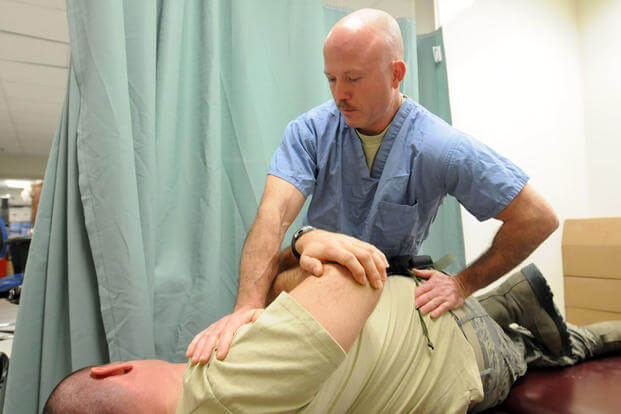A decade after being asked to study how chiropractic care may increase fitness among troops with lower back pain, the Defense Department has submitted its report to Congress.
The answer? It works.
But service members still shouldn't expect the treatment to be available at every military health facility.
And as for military family members, retirees and their families, the benefit, along with other alternative therapies, remains uncovered by Tricare.
Earlier this month, Acting Assistant Secretary of Defense for Manpower and Reserve Affairs James Stewart sent a final report to Congress on three clinical trials conducted in the last 10 years at military health facilities by Rand Corp., Palmer College of Chiropractic and the Samueli Institute to determine whether chiropractic care can ease lower back pain in troops, help service members stop smoking and increase readiness.
Related: Does Tricare Cover Chiropractic Care?
The $7.5 million study was ordered under the fiscal 2010 National Defense Authorization Act, signed into law on Oct. 28, 2009. According to the report released Sept. 6, the trials showed some positive results.
The first clinical trial, to determine whether chiropractic care reduced pain and helped troops stop smoking, showed statistically significant improvement for service members with back pain who received chiropractic care alongside regular medical care.
The second trial, to test whether chiropractic care had any effect on the reaction and response times of special operations troops, showed that a single session had an immediate effect on motor response.
But the trials also found that chiropractic care had no real influence on smoking cessation, nor did the acceleration of response time among special operators last after the initial effect.
The third trial -- on whether chiropractic care improves fitness among troops with back pain -- showed that those who received such care saw a 5% increase in isometric strength, as opposed to a 6% decrease in strength among the control group, made up of service members who also had lower back pain but didn't receive chiropractic care.
Endurance also increased 14% in the chiropractic group, compared with a 10% decrease in the control group, according to the third trial.
"Based on the results, the investigators concluded that chiropractic care improves key fitness characteristics among active-duty service members with lower back pain and could lead to improved military readiness in such individuals," the report notes.
While Congress passed a law in 2000 requiring the Defense Department to offer chiropractic care for active-duty personnel and activated Reserve and National Guard members, it is available in only 65 of the DoD's 54 military hospitals and 377 clinics.
And it remains unavailable for military dependents and retirees, at military health facilities and off base. Each year, lawmakers offer legislation that would require the DoD to develop a plan for providing chiropractic health services for these beneficiaries, but it has failed to gain steam.
A bipartisan group of 29 House members has backed Rep. Mike Rogers, R-Alabama, this year on a proposal to provide chiropractic care services for Tricare beneficiaries, but the bill has not been considered by the House Armed Services subcommittee on military personnel.
A similar measure, which also would include coverage for non-activated reservists, has been introduced by Sen. Tammy Baldwin, D-Wisconsin, and Sen. Jerry Moran, R-Kansas, in the Senate.
"Many of the brave men and women who serve our country have sustained back and other neuromusculoskeletal injuries that can be treated through chiropractic care," Moran said in a prepared statement.
"Military retirees, reservists and National Guard members have served and sacrificed for our nation and the freedoms we all cherish. We all have a shared responsibility to do right by them," Baldwin said earlier this year while reintroducing the legislation.
A 2018 survey by the advocacy group Blue Star Families found that alternative care options, including chiropractic care and acupuncture, were the top improvement military spouses wanted added to Tricare health benefits.
In his letter to the chairmen and ranking members of the House and Senate Armed Services Committees, Stewart did not say whether the DoD is considering an expansion of chiropractic services at military health facilities or for Tricare beneficiaries.
"Thank you for your interest in the health and well-being of our service members, veterans, and their families," he wrote.
-- Patricia Kime can be reached at Patricia.Kime@Military.com. Follow her on Twitter at @patriciakime.
Read more: AFSOC's 'Ultimate Battle Plane' Now Operating in Afghanistan














